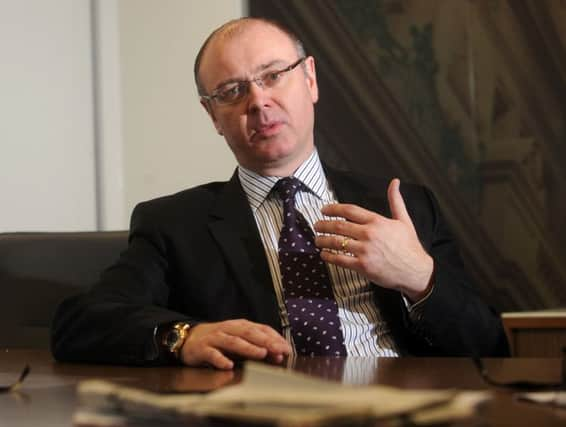Anxiety atEU poll'¨'˜causing'¨economic slowdown'


Martin Jenkins, the Leeds-based practice senior partner at Deloitte in Yorkshire and the North East, said that many senior financial figures regarded the referendum as the top risk facing their businesses.
Mr Jenkins made the comments after Deloitte’s latest survey concluded that support for the UK remaining a member of the European Union has risen among chief financial officers (CFOs) of the UK’s largest companies.
Advertisement
Hide AdAdvertisement
Hide AdThe survey also found that many corporates are “pulling in their horns” and rising uncertainty was reducing the appetite for corporate risk.
Seventy five per cent of CFOs quizzed by Deloitte said they favoured the UK remaining in the EU, up from 62 per cent in the fourth quarter in 2015 and 74 per cent in the second quarter.
Eight per cent said UK business would benefit from leaving the EU, up from six per cent in the fourth quarter and two per cent in the second quarter.
Seventeen per cent were uncertain of their position or preferred not to say, up from four per cent in the fourth quarter.
Advertisement
Hide AdAdvertisement
Hide AdCommenting on the findings, Mr Jenkins said: “These results show a high level of support among chief financial officers for the UK remaining a member of the European Union.
“CFOs see significant benefits in UK membership, particularly in terms of helping UK exports, attracting investment and strengthening the UK’s influence and connections with the wider world.
“However, we are already seeing the unsettling effect of the referendum on business sentiment.
“Our survey shows declining risk appetite among CFOs, with the referendum rated as the top risk their business faces, and we have seen a marked slowdown in M&A (merger and acquisition) activity as businesses put plans on hold for now.
Advertisement
Hide AdAdvertisement
Hide Ad“While voices on both sides of the debate argue about the potential economic impact of a ‘leave’ vote, the referendum appears to already be contributing to a slowdown.”
Eighty nine per cent of the survey’s respondents said membership of the EU had helped UK export performance and 86 per cent said it has attracted foreign direct investment.
The survey also found that CFOs rank the EU referendum as the biggest risk their businesses face.
On a scale of 0 to 100 (where 100 is the greatest risk) CFOs gave the EU referendum a risk rating of 54, up from 50 in the fourth quarter of 2015.
Advertisement
Hide AdAdvertisement
Hide AdThe EU referendum ranked ahead of economic weakness in the euro area (48), weak demand in the UK (46) and the prospect of higher interest rates in the UK (44).
Twenty six per cent of CFOs who were quizzed as part of the survey said their company has made, or is in the process of making, contingency plans for a possible British exit of the EU.
However, 53 per cent said they have made no such plans.
Ian Stewart, chief economist at Deloitte, said: “A fog of uncertainty has descended on the corporate sector.
“Perceptions of financial and economic uncertainty are back to levels last seen in early 2013 as the euro crisis abated.
Advertisement
Hide AdAdvertisement
Hide Ad“Now the dominant concern is the EU referendum, which tops the corporate worry list, eclipsing long-standing concerns about emerging markets and growth in the euro area. Rising uncertainty has eroded corporate risk appetite. Corporates are pulling in their horns, with expectations for hiring and capital spending at three year lows.”
Seventy seven per cent of the survey’s respondents said that now is a bad time for UK corporates to issue equity.